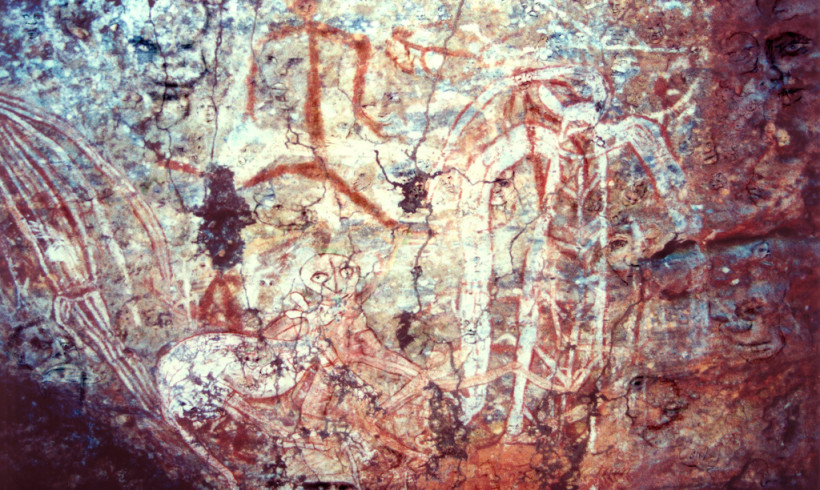That child’s hand above your head; the hand of a little girl long dead.
Kakadu. Djidpi Djidpi. Two blocks of ochre. One grinding hollow. A grinding stone. Five moments of pressure. Thirty reed brushes.
Voices echo off the high sandstone ceiling: thirty young lilts and accents reverberating this way and that, intermingling with the dusty air, weaving in and out until all that can be heard is a cosmopolitan merry-go-round.
They had come, nominally, to see the art of their ancestors. Those imprints made long before by children who gave birth to their grandmother’s grandmother. They had come to speak to the past, feel the echoes, to receive and give something in return.
Simpler, back to the essence they went. Delicate, detailed lines. Images and reality. Then with growing confidence, quicker and stronger. Circles, lines, dots, smudges, whole hands, faces, tongues, penises, breasts – letting the emotions charge their fingers and pierce their feet as they danced in the sandy shelter. It was rapturous.
Thirty heads on one body: a centipede of huge proportions, sliding, gadzumping over the ancient landscape, squeezing between rough-edged red-boulders and up sheer rock faces, on an unbeaten path, following a smell of something that went before. Its numerous jaws were wide and clacking, showing blackened teeth stained with the smoke of eons. It was ghastly to behold. Then there were the tears of each night as it curled tight between cold rocks and dreamed of a past that never was.
The past is a foreign country. We seek something that we have seen in a glossy magazine. We are sold an ideal of a geographic and cultural milieu, essentialised and imaginary. We walk the paths with the smell of chemical ink in our nostrils; the spine cracked as we press our noses deep into the creases; trying to make sense of a world we will never place a finger on – a world that never existed, even for those who lived it.
And when we don’t find it, who do we blame? Not ourselves, for seeking the impossible. Not our travel agent for selling us a pipe dream. No, we blame the place we are in; we blame its lack of authenticity, its messiness, its attempts to be like us. We critique its colonial imperative; we curse a mutilated history – that is, the only reason we can approach it in the first place. We seek greater authenticity; we delve deeper into the jungle; we perpetuate through our very journeying customs we wish to see, performed for us, standing here with gaping maws, standing here in power.
And only then do we relax and sigh and say thank god, we have finally found it, as we sit back in our deckchairs and sip. Our performers too return home to their satellite dishes and deckchairs and sip having performed a meaning we wanted to see.

